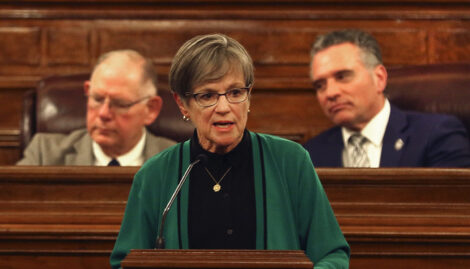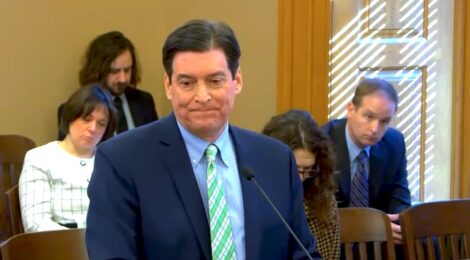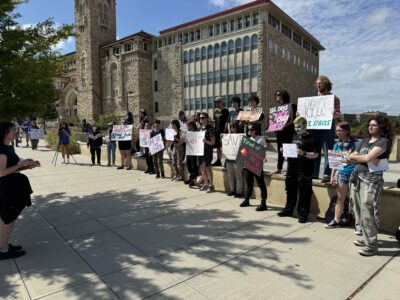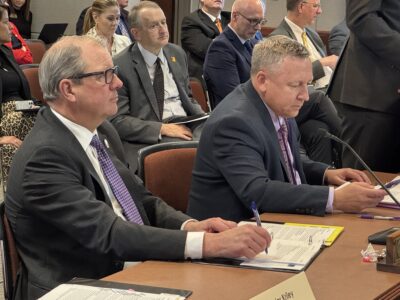Kansas Supreme Court orders state to remove Taylor from Senate ballot

Kansas Secretary of State Kris Kobach said he was disappointed, but not surprised, by a Kansas Supreme Court ruling that said Democrat Chad Taylor's name must be taken off the Nov. 4 ballot for U.S. Senate. Kobach said he expects the Democratic Party to name a replacement candidate, but party officials have so far not committed to doing so.
Topeka ? The Kansas Supreme Court on Thursday ordered Secretary of State Kris Kobach to remove Democrat Chad Taylor’s name from the Nov. 4 ballot for the U.S. Senate, saying Taylor had met the requirements for pulling out of a race that are outlined in state law.
The ruling late Thursday came less than 72 hours after the court heard oral arguments in a case that was put on a fast track because of upcoming deadlines for printing and mailing absentee ballots to voters overseas.
“Taylor’s petition … is granted, and Kobach is ordered to comply with his clearly defined duty imposed by (Kansas law),” the court said in a unanimous, unsigned opinion. “He shall not include Taylor’s name on any ballots for the office of United States Senate for the general election on November 4, 2014.”
That decision could dramatically alter the dynamics of the midterm election, where incumbent Sen. Pat Roberts, a Republican, has been polling at about 40 percent or less. The ruling leaves independent candidate Greg Orman as the sole significant challenger in the race, and recent polls have shown Orman leading Roberts in a head-to-head contest.
Nationally, Republicans have hoped to regain control of the U.S. Senate this year, but until recently few had considered the possibility that Roberts could lose in Kansas, a traditional Republican stronghold. Democrats currently hold an effective 55-45 majority in the Senate.
In its ruling Thursday, the state high court did not address the question of whether the Kansas Democratic Party will be required under law to name a replacement candidate, something that could throw another twist into an already extraordinary race.
“The Kansas Democratic Party is not a party to this original action, and this court does not issue advisory opinions,” the court said.
But Kobach said he believes the law requires the party to name another candidate and sent a message to the state Democratic Party headquarters saying he expects them to do so by noon Sept. 26.
“I am further requesting that the Kansas Democratic Party make every effort to facilitate the orderly administration of this election and select someone that has agreed he or she will serve if elected,” Kobach said.
State party chairwoman Joan Wagnon was out of state Thursday and unavailable for comment on the question of a replacement candidate, although she issued a written statement applauding the court’s decision. But party spokesman Dakota Loomis said no decision has been made about attempting to name another candidate.
“I can’t speak to that,” Loomis said. “But based on his track record, I don’t think Kobach should be telling anyone what the law requires of them.”
By giving the party another week to name a candidate, Kobach also pushed back the deadline for printing and mailing ballots to an estimated 526 Kansas voters who are civilians living overseas or military personnel stationed outside of Kansas. That includes 57 active-duty military personnel who are deployed overseas.
Because those ballots will be mailed out late, Kobach said, the deadline for returning the ballots will also be pushed back beyond Election Day, Nov. 4.
Taylor withdrew from the race after winning a contested primary for the Senate nomination. Many Democrats had urged him to withdraw because polls after the primary showed Roberts getting only about 40 percent of the vote, while Taylor and Orman were splitting the anti-incumbent vote.
He filed his withdrawal Sept. 3 after conversations with Sen. Claire McCaskill, D-Mo., although McCaskill has expressly denied urging Taylor to pull out.
But Roberts’ campaign manager, Corry Bliss, condemned the court’s ruling as an act of partisan gamesmanship that plays into the national Democratic Party’s hands.
“Today, the Kansas Supreme Court deliberately, and for political purposes, disenfranchised over 65,000 voters,” Bliss said, referring to the rough number of Democrats who voted in the Aug. 5 primary.
“In a bow to Senators Claire McCaskill and Harry Reid (D-Nev.), liberal activist Supreme Court justices have decided that if you voted in the Democrat Primary on August 5th, your vote does not matter, your voice does not matter, and you have no say in who should be on the ballot on Election Day,” Bliss said. “This is not only a travesty to Kansas voters, but it’s a travesty to the judicial system and our electoral process.”
The legal issue in the case boiled down to whether Taylor had complied with the law by making a declaration that, if elected, he would be incapable of fulfilling the duties of office. That was language inserted into the law by the 1997 Legislature in an effort to end the practice of parties naming place-holder candidates until after the filing deadline or after the primary.
Kobach rejected Taylor’s request to withdraw, saying he never made such a declaration. But Taylor argued that the declaration was implied because he withdrew “pursuant to” the statute that requires one.
In its ruling, the court agreed with Taylor, citing a legal dictionary’s definition of the phrase.
Kansas Senate President Susan Wagle, R-Wichita, said she thinks the court ignored the Legislature’s intent when it amended the law in 1997.
“I clearly recall the debate when we passed this statute,” Wagle said. “Our intent was to limit political gamesmanship and last minute maneuvering. It is troubling to see our state’s highest court again perpetuate political activism and condone a national power play that deceives and invalidates Kansas voters.”





